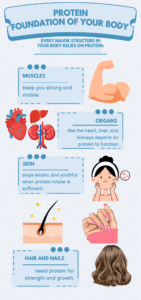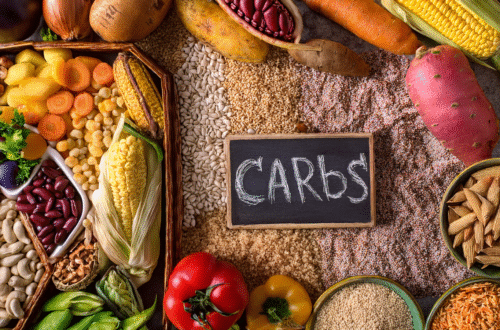When you look in the mirror, what you see—your skin, hair, muscles, even your nails—is mostly built from one key nutrient: protein. Without enough of it, your body can’t repair, grow, or defend itself properly. Protein isn’t just for athletes or bodybuilders—it’s essential for everyone, every single day.
Protein: The Foundation of Your Body
 Protein is the foundation of your body — it keeps your muscles strong, supports vital organs, maintains youthful skin, and promotes healthy hair and nails[/caption]
Protein is the foundation of your body — it keeps your muscles strong, supports vital organs, maintains youthful skin, and promotes healthy hair and nails[/caption]Every major structure in your body relies on protein:
-
- Muscles keep you strong and mobile.
-
- Organs like the heart, liver, and kidneys depend on protein to function.
-
- Hair and nails need protein for strength and growth.
-
- Skin stays elastic and youthful when protein intake is sufficient.
When protein is lacking, muscles weaken, posture sags, hair becomes brittle, and nails break easily. Even energy levels drop.
How Protein Powers Energy and Recovery
Although carbohydrates supply quick energy, protein ensures that energy is used efficiently. Protein helps maintain steady blood pressure, supports oxygen delivery through healthy red blood cells, and enables the production of enzymes that unlock energy from food.
Without enough protein:
-
- Fatigue becomes a daily struggle.
-
- The body fails to recover after stress or exercise.
-
- Infections become harder to fight.
Protein and Immunity
One of protein’s most vital roles is supporting your immune system. Antibodies (your body’s defense soldiers) are made of protein. White blood cells also need protein to fight bacteria and viruses. Research shows that when people increase their protein intake, their antibody production can multiply dramatically within just a week.
Digestion and Protein Deficiency
Did you know your digestive system relies on protein too?
-
- Enzymes that break down food are protein-based.
-
- Muscles in the stomach and intestines (which push food along) need protein to stay strong.
When protein is inadequate, digestion slows, constipation develops, and gas or bloating becomes common. This is why many people with low-protein diets also struggle with chronic stomach issues.
Signs You May Not Be Getting Enough Protein
-
- Persistent fatigue
-
- Brittle nails and hair loss
-
- Weak muscles or poor posture
-
- Frequent infections or slow healing
-
- Swollen ankles or puffy face (caused by water retention)
Where to Get Quality Protein
High-quality proteins contain all the essential amino acids your body cannot produce. The best sources include:
-
- Animal proteins: Eggs, milk, cheese, fish, poultry, lean meats.
-
- Plant proteins: Soybeans, lentils, beans, nuts, seeds, and whole grains (best when combined for balance).
-
- Budget-friendly boosters: Skim milk powder, brewer’s yeast, wheat germ, and soy flour.
How Much Protein Do You Need?
Experts recommend at least:
-
- 60–70 grams per day for women
-
- 70–100 grams per day for men
-
- More for children, pregnant or lactating women, and anyone recovering from illness or intense activity
Many people unknowingly consume far less than this, especially if they rely heavily on processed foods or avoid dairy and meat.
Final Thoughts
Think of protein as the framework of your health. Without it, the body weakens from the inside out. With enough, you gain strength, resilience, and vitality. If you want lasting energy, strong muscles, glowing skin, and a powerful immune system, prioritize protein in every meal.




